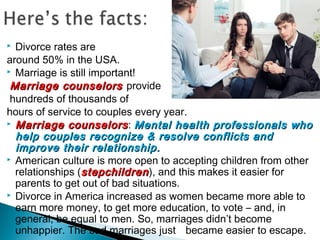Stereotypes & Myths in USA
- 2. MythMyth: An idea or story that many people believe is true, but it is not. AssumptionAssumption: Something that is taken as true or certain to happen, but has no proof. GeneralizationGeneralization: When you think something is true always for all of something, but it is really only true some of the time or rarely.
- 4. Just like in China, American children are taught many cultural things from birth. One of these things is self-sufficiencyself-sufficiency. Self-sufficiencySelf-sufficiency: Not needing help to provide forNot needing help to provide for one’s daily needs.one’s daily needs. This is considered the way to be responsible and respectful to parents and family. Just like in China, different American families do different things. However, cases like this are extreme and rare. They are the exception and not the rulethe exception and not the rule. Exception and not the ruleException and not the rule: Something that isSomething that is very much out of the ordinary.very much out of the ordinary.
- 5. In your country – One of your classmates graduated from university. Now, he still lives with his parents. He stays home all day and watches tv and plays video games. His parents go to work each day. He spends his parents’ money and he gets everything he needs for life from them. In your culture, is this a good son? Most people say “No!” – America is the same. We are taught to take care of ourselves when we become adults. So most young adults will either go to college or get a job.
- 7. The Second Amendment to our Constitution does allow people to own guns as a way to protect themselves. No, not all people own gunsnot all people own guns. No, people are not required to have guns. No, people are not required to learn how to shoot a gun. Some people do like guns. People who like guns are not always violent people. Some people like to hunthunt.
- 9. Divorce rates are around 50% in the USA. Marriage is still important! Marriage counselorsMarriage counselors provide hundreds of thousands of hours of service to couples every year. Marriage counselorsMarriage counselors: Mental health professionals whoMental health professionals who help couples recognize & resolve conflicts andhelp couples recognize & resolve conflicts and improve their relationship.improve their relationship. American culture is more open to accepting children from other relationships (stepchildrenstepchildren), and this makes it easier for parents to get out of bad situations. Divorce in America increased as women became more able to earn more money, to get more education, to vote – and, in general, be equal to men. So, marriages didn’t become unhappier. The bad marriages just became easier to escape.
- 11. Much of the world thinks Americans eat only fast food because so many Americans are obese.obese. There is a portion of the population that can’t afford healthy food. Often, junk foodjunk food & fast foodfast food is cheaper than healthy meat, fruit, and vegetables. Just like in China, different people have different eating habits. Reasons include many things, such as gaps in food education and regional food cultures. These unhealthy foods have a lot of commercials.commercials.
- 13. SuburbsSuburbs generally offer a quiet lifestyle that is attractive to families with small children. They became popular after WWII because soldiers came home from the war and started families, and middle-classmiddle-class income began to increase.
- 14. Suburbs often have more affordable houses, so people with more modest incomesmodest incomes move there so they can get more bang for the buckmore bang for the buck. SuburbsSuburbs: districts far away from the center of the city, especially residential districts. With each new generation, more young people are moving into cities and changing their lifestyles for both economic and social reasons
- 16. American family structure is different than Chinese family structure. Retirement age is higher in America. ◦ MandatoryMandatory retirement is as high as 70 years of age ◦ OptionalOptional retirement age is occasionally as young as 62. ◦ MajorityMajority retire at 65-67 years of age.
- 17. Cost of livingCost of living in America is much higher than in China, so in most families both the husband and wife must work to have enough money for the family. They don’t have the luxuryhave the luxury of staying home to take care of grandchildren or older family members. Because of our culture of self-sufficiencyself-sufficiency, many older people want to live in their own homes for as long as possible.
- 18. Live with their childrenLive with their children: Some seniors will see this as a sign of their weakness. They are embarrassed to be too old or too weak to take care of themselves. Many seniors will think they are being a burden on their children or that they are taking their lives and happiness away from them. (But usually they are wrong!) Mother-in-law SuiteMother-in-law Suite: Homes with a separate small apartment Assisted Living FacilityAssisted Living Facility: Group home for seniors with medical professionals to give limited help. Nursing HomesNursing Homes: Home for seniors who require professional medical care all the time. Like with anything else, there are exceptions. There’s aLike with anything else, there are exceptions. There’s a small percentage of seniors without family attention. But,small percentage of seniors without family attention. But, again, it is theagain, it is the exception and not the ruleexception and not the rule.


















